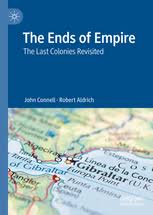Do Empires End? And what about the ‘leftover’ colonies?

What do Christmas Island, Gibraltar and Greenland have in common? Those places, like American Samoa, the British Virgin Islands and French Polynesia, are all overseas territories of larger continental states, often far removed from the ‘mainland’ of which they are a part. They are the remains of older colonial empires that never gained independence. About fifty such territories spread around the world continue to be administered by Britain, France, the Netherlands, Denmark, Spain, the United States, Australia and New Zealand. Most are small island countries in the Atlantic, Caribbean, Indian Ocean and Pacific, though they also include large countries such as Denmark’s Greenland in the North Atlantic and French Guiana in South America. A few are famous – St Helena, a British territory, was Napoleon’s home in exile. Others have been the source of disputes, from an independence movement in French New Caledonia to conflict between Britain and Argentina about sovereignty over the Falkland Islands and by Britain and Spain over ‘possession’ of Gibraltar. Yet other territories – the Cayman Islands, Ceuta and Melilla, Saint-Pierre-et-Miquelon – are well known only to avid map-readers or travellers to exotic sites.
The Ends of Empire: The Last Colonies Revisited, by two University of Sydney academics, Robert Aldrich, Professor of European History, and John Connell, Professor of Geography, examines these fascinating spots around the globes, reflects on why decolonisation seemingly stopped before reaching these outposts, and what stakes they represent in the contemporary world. Their new 522-page book, published by Palgrave Macmillan in London, ‘revisits’ territories first explored in two co-authored volumes they published twenty years ago: France’s Overseas Frontier (1992) and The Last Colonies (1998). The Ends of Empire, however, is a completely new book, looking at what has changed and what has not changed in these places over the last decades and situating them in the context of the complex politics, cultural issues, economics and international relations in the twenty-first century.
The authors argue that, rather than being seen as failures of decolonisation, these overseas countries and territories represent a kind of negotiated ‘semi-sovereignty’ that, for most of their inhabitants, brings the sort of security and standard of living that would be endangered if they became independent. Their residents, for the most part, are fully-fledged citizens of the larger nation-states to which the territories belong, and they have rights of abode there. They are eligible for social welfare payments, they have access to better education and health care than is available to most of those who live in similar neighbouring countries, and they have increasingly gained recognition for local Indigenous and the Creole cultures. The internet age has plugged in many remote and isolated territories to the wider world, and easier travel has made it possible for larger numbers of people to move in and out of the territories. Because of all this, all referendums proposing independence for these territories in recent years have been defeated.
These territories are nevertheless faced with the problems of dependent economies, occasional social and ethnic discord, scandals caused by corruption and dodgy financial affairs, natural disasters and the threats of climate change, and issues surrounding irregular migrants and refugees. Their leaders bicker continuously with metropolitan authorities about the division of power between national and local authorities and the niceties of constitutional status. Some worry about the designs of outside powers and object to the militarisation of their territories. There is concern about who actually ‘belongs’ in these countries, some with Indigenous people such as Polynesians, Kanaks and Inuit, and all with cosmopolitan populations created through decades or sometimes centuries of colonialism and more recent movements of people.
Australia’s Christmas Island, the Cocos (Keeling Islands) and Norfolk Island are three of these overseas territories. Debates about the use of Christmas Island for detention camps for refugees and possible quarantine stations for those with coronavirus underline the fact that the Australian external territories, like those of other places, are not just international oddities with merely folkloric interest. Their variegated histories and cultures are typical of the mixing and mingling of peoples and cultures that characterise the diverse overseas territories, from the French island of Reunion – with over a million people descended from European settlers, African slaves and Indian indentured labourers – to Pitcairn Island – a British territory of only several dozen inhabitants who trace their ancestry to the survivors of the mutiny on the Bounty and the Polynesians who ended up on the islands with the mutineers.
This interdisciplinary study provides a new perspective on the history of decolonisation and a comprehensive analysis of a group of territories that have not become independent and whose residents, in the main, do not wish for them to do so. It examines the way cultures have blended, political authority has been negotiated, economic structures have evolved, and even small outposts have been drawn into the currents of the contemporary world order. It also considers other anomalies in among independent nation-states, from European micro-states that have survived for hundreds of years to countries of uncertain or unrecognised sovereignty, and from areas of new colonial expansion such as the South China Sea to places where there remain militant independence movements such as West Papua or demands by First Nations people for acknowledgement of their special position. It highlights the legacies left by colonialism even in small islands and enclaves sometimes forgotten by outsiders. The Ends of Empire suggests that imperial situations will probably never come to an end, but that the very existence of these semi-sovereign overseas territories mandates thinking anew about what decolonisation, nationalism and sovereignty mean in today’s world.
The Ends of Empire will be available in Australia in October 2020. For further information, see https://www.palgrave.com/gp/book/9789811559044
